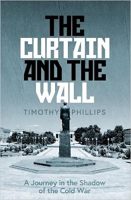
Stalking the Atomic City by Markiyan Kamysh (Pushkin Press, £12.99, July 7)
The “atomic city” is Chernobyl, or “Chornobyl”, as it’s spelt in Ukrainian, the site of an explosion at a reactor in 1986 that spread radiation across Europe. More recently, it was occupied for five weeks by Russian troops, but is now back under Ukrainian control. Until the Russian invasion, Kamysh, a Ukrainian and son of a physicist who helped to clean up after the disaster, was illegally exploring the Exclusion Zone, along with dozens of other “stalkers” who knowingly expose themselves to radioactivity. In this debut, he sets out to explain the pull of a “land of tranquillity and frozen time”. Jasper Rees, reviewing Kamysh’s “electric shock” of a memoir in The Daily Telegraph on Saturday, said it was, “among other things, a suicide note… Spiritually it feels more akin to the literature of mountaineering, where the life wish and the death wish go head to head.”
In a Land Far from Home by Syed Mujtaba Ali; Through Khiva to Golden Samarkand by Ella R Christie; Desert Soul by Isabelle Eberhardt (John Murray Journeys, £12.99 each; July 11)
These three latest additions to the John Murray collection of “classic and rediscovered adventures”, with introductions, respectively, by Taran Khan, Caroline Eden and William Atkins, are due to be launched at an online event hosted by the bookseller Stanfords (sponsor of the Stanford Dolman Travel Book of the Year award) next Monday (July 11).
The Responsible Traveller by Karen Edwards (Summersdale, £7.99, July 14)
A pocket-sized primer (160 pages), from a writer specialising in responsible tourism and sustainable living, on ways to explore the planet while minimising our negative impact on climate, communities and wildlife.
Landscapes of Silence: From Childhood to the Arctic by Hugh Brody (Faber, £12.99, July 21)
The anthropologist and film-maker Hugh Brody grew up in Derbyshire, in the aftermath of the Second World War, in a Jewish family “riven by worries that it might or might not belong”. He “had to escape the shadows, the uncertainties”. At first he did so on bike rides from the suburbs to the moors; later he lived and worked everywhere from Ireland to India and then the Canadian Arctic. In Landscapes of Silence, he explores “a tangle of connections between where I came from and where I went to”.
On the Wandering Paths by Sylvain Tesson; translated by Drew S Burk (University of Minnesota Press, $19.95, July 26)
After a free-climbing accident that left him in a coma and kept him in hospital for four months, the prize-winning French writer Sylvain Tesson made a promise to himself: if he was ever able to walk again, he would cross the whole of France on foot. In On the Wandering Paths, which his publisher says is “part literary adventure, part philosophical reflection on our contemporary consumer culture”, he traces the routes peasants once followed through the countryside, taking us deep into the heart of rural France. (The book has been a bestseller in France; a film based on it, Les Chemins de Pierre, starring Jean Dujardin, is due for release later this year.)
The Passenger: California (Europa Editions, £18.99, August 4)
How is the California dream looking at the moment? That’s a question explored in the next issue of Europa Editions’ excellent place-based magazine, which considers the impact on the state of growing inequality, a dwindling population and climate change. Contributors include Francisco Cantú (author of the acclaimed The Line Becomes A River, a memoir of his time as a US Border Patrol agent), who argues that Yosemite National Park is as intrinsically linked to its violent human past as to its rocks and waterfalls; and Lauren Markham, a writer and journalist specialising in the environment and migration, who celebrates the first successes of “rematriation” — the return of land to the Indigenous communities from whom it was long ago stolen.
 The Curtain and the Wall: A Journey in the Shadow of the Cold War by Timothy Phillips (Granta, £20, October 13)
The Curtain and the Wall: A Journey in the Shadow of the Cold War by Timothy Phillips (Granta, £20, October 13)
At a time when we seem to be entering a new Cold War, here’s a book on the hangover from the original one. Timothy Phillips grew up in Northern Ireland during the Troubles, when bombings and shootings were all motivated in one way or another by a border. He went to one of the few schools there that taught Russian, and had his first lesson less than a year after the fall of the Berlin Wall, when the Soviet Union still existed. In his latest book, he travels from the Arctic Circle to Turkey’s eastern border, tracing the history of the Iron Curtain and meeting the people who live with its legacy.

Leave a Reply